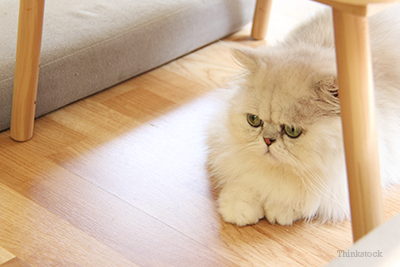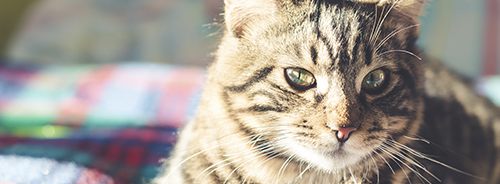Overview of chronic kidney disease
Chronic renal failure, also known as kidney disease, is a common problem in cats. One in three cats will develop chronic renal failure during her lifetime. Your cat’s kidneys are critical for normal bodily functions, such as the removal of toxic metabolic waste products from the blood, and regulation of bodily fluids and hormones. What does chronic kidney disease mean? "Chronic” means long-lasting; therefore, chronic renal failure simply means that there is a decline in the kidneys’ ability to function over a long period of time. Because the kidneys impact other areas of the body, the changes that occur as a result of chronic kidney disease impact many other bodily systems, as well.

Symptoms of chronic kidney disease
- Increased output of urine--With indoor cats, you may notice “flooding” of the litter box
- Increased thirst
- Vomiting
- Weight loss
- Incontinence (uncontrolled urination)
- Bad breath with a peculiar chemical odor
- Lethargy
If you notice ANY of these symptoms in your cat, you should contact your veterinarian ASAP! They are indicators of many serious diseases and conditions. Your veterinarian can perform tests that will identify why your dear friend is sick. Catching any problems before they become severe will increase your pet’s overall quality of life!
Diagnosis of chronic kidney disease
The tests your veterinarian may choose to run include:
- Urine tests
- Chemistry tests
- A complete blood count
- Electrolyte tests
- Radiographs (x-rays)
Other tests may be recommended, depending on your cat’s particular situation.
Treatment of chronic kidney disease
Your veterinarian will discuss treatment options that are tailored to your pet’s needs, as each case is unique.
Treatment may include:
- Fluid therapy to rehydrate and normalize electrolyte and acid-base levels
- Nutritional therapy, including a high-quality restricted diet
- Drug therapy for possible underlying conditions like anemia
- Medications to lower blood phosphorus levels, if increased
Prevention of progressive chronic kidney disease
Being a vigilant pet owner and taking your pet for routine checkups is the key to the prevention of progressive chronic kidney disease. If you suspect your cat has any of the common signs of renal failure, contact your veterinarian immediately. To learn more about kidney disease, watch this video on why early diagnosis of kidney disease is a good thing.
Next, click here for a closer look at chronic kidney disease in cats.
If you have any questions or concerns, you should always visit or call your veterinarian – they are your best resource to ensure the health and well-being of your pets.

